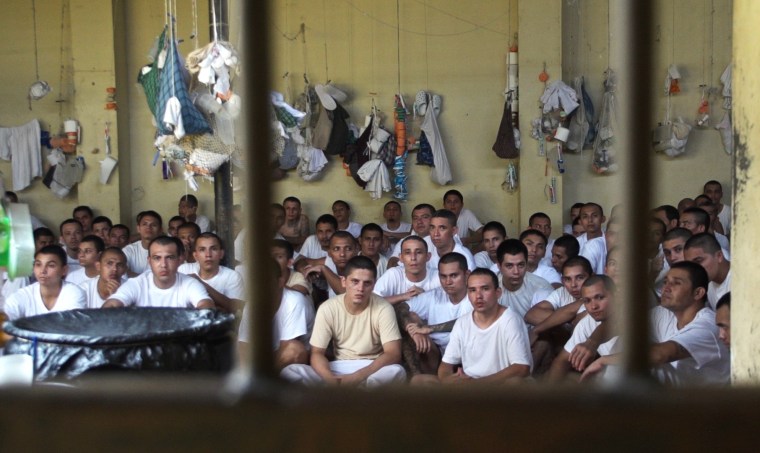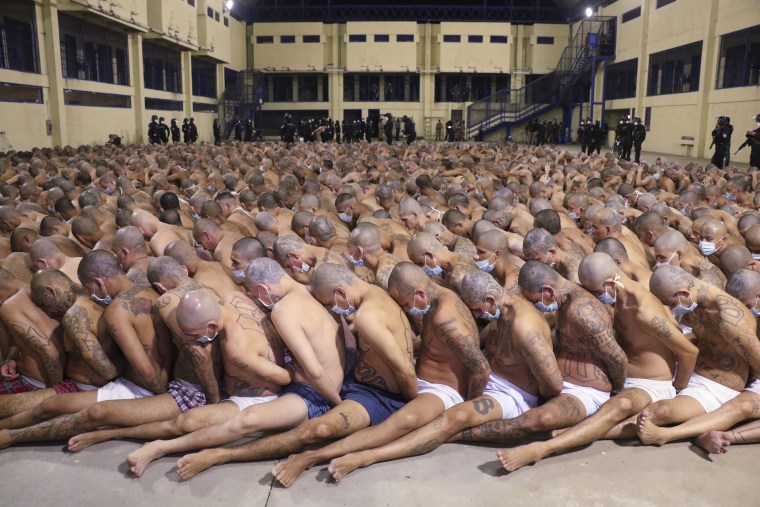SAN SALVADOR, El Salvador — They're rival gang members and they now share a prison cell.
In the midst of the COVID-19 pandemic, El Salvador has adopted an unprecedented measure: putting members of the transnational gangs Mara Salvatrucha, or MS-13, and the two factions of Barrio 18, or 18th Street Gang, together in prisons. The controversial move has generated international attention — as well as fierce criticism.
Since the end of April, "emeeses" and "eighteen men" — as the rival members are known in Spanish — have shared crowded spaces in six prisons across the country. These groups have been deadly rivals since the gang phenomenon erupted in the country in the early 1990s.
"Now we are already living together with our fellow companions from the letters [a reference to MS13], right?" said Ariel Alexander Ávila Gómez, an active member of the Barrio 18-Sureños gang who is being held in the Ciudad Barrios prison in San Miguel. "It's something we never would have thought of, right? But we're getting used to each other."
Noticias Telemundo got exclusive access to the Barrios prison, 100 miles east of the capital, San Salvador, and spoke to rival members who had been sharing a cell for several days.
In the three decades since the first graffiti alluding to MS-13 and 18 began to appear in El Salvador, it is the first time that thousands of active members are sleeping literally shoulder to shoulder.
The government's decision to house rival members together came after a killing spree at the end of April.According to the National Police, there were 85 murders, an average of 17 a day, up from two a day.
The government attributed the explosion of violence to MS-13 and said the orders to amp up the violence had come from imprisoned gang leaders.
"We want to prevent orders from going out abroad," said Osiris Luna, the director of the country's prison system. "In previous administrations, penal institutions served as headquarters for a gang to exercise control over the state."
Since the gangs have been put together, there haven't been any reports of gang violence.
Inside the Ciudad Barrios prison
More than 2,000 inmates were in three designated areas where rival gang members shared overcrowded cells.
Ávila Gómez, of the Barrio 18-Sureños gang, was one of 90 inmates who shared a space designed for 30 people: "Here, as you can see, we are greatly overcrowded — there are 46 of our gang's faction and 44 of the other."
The inmates themselves have organized; each cell has designated one manager per gang. In a section of the jail shared by the MS-13 and 18-Sureños, Ávila Gómez's counterpart is Francisco Arturo Quintero.
"We are trying to live together, as my fellow inmate told you. We did not expect this. It has been a surprise for us to be here, but we have coordinated between both gangs so that everything goes well," Quintero said.
The comments reflect a full-blown prison truce — in gang slang, it is called running the South — and it has been implemented simultaneously in the six prisons with active gang members and in the gang sectors of the Zacatecoluca Penal Security Center, known as Zacatraz.
In California, "running the South" applies to the terms the Mexican mafia, known as "La Eme" ("The M"), imposes on its gangs, which operate in the southern half of the state.
Now, it's a general term denoting nonaggression in El Salvador among MS-13, the two factions of Barrio 18 and La Mirada Locos 13, although the latter gang has little territorial control.
A 'truce' across prisons
It is the first time that, in practice, the South, or truce, has been run in the prison system.
A prison intelligence report dated April 29 establishes the agreements and rules for coexistence in the Izalco Phase II Penitentiary Center.
The information, provided by a gang member, refers in principle to practical issues such as the use of toilets and barrels of water, but it also specifies how outbreaks of violence will be resolved. "If they create any problems [inside the cell] and lives are lost, and the one who started does not die, he will have to pay with his life," says one of the nine points in the report.
In September 2004, El Salvador made a controversial public policy move, assigning entire prisons to one gang, because they already had thousands of their members incarcerated.
The measure put a stop to the massacres between the gangs or between gangs and organized gangs of "civilians" [as gang members call non-gang members] within the prisons. But it also internally consolidated criminal structures, so prisons became the command center for the cliques and tribes that operate in thousands of Salvadoran neighborhoods and towns.
In 2016, during President Salvador Sánchez Cerén's administration, the first efforts were made to change that: Some prisons stopped being exclusive to one gang or the other, but they remained isolated from one another within the facility.

From July to August 2019, just after Nayib Bukele became president, there were massive transfers of gang members between prisons, and members of the three gangs were assigned to prisons — and sectors within each prison — that for years had been controlled by a single gang.
The Ciudad Barrios prison had been handed over to MS-13 for almost 15 years. "It was the headquarters of the gang," Osiris Luna said. Since August, rival gangs have shared sectors of the prison but not individual jail cells. That changed in April.
The doors, which were made of bars, have been covered with metal plates. "A total seal, so that they cannot communicate through the sign language they use or through another type of language," Luna said.
"From now on, all the gang cells in our country will remain sealed. They will be inside, in the dark, with their friends from the other gang," Bukele tweeted on April 27. By then, images of hundreds of gang members in their underwear, handcuffed and bumped against one another during a global pandemic, had already traveled the world.
Luna confirmed the prison truce: "There has definitely been no altercation between the gangs in the same cell, and as they have said, they have a nonaggression pact."
What happens next?
Bukele's announcement was fiercely criticized in El Salvador and abroad.
José Miguel Vivanco, director of Human Rights Watch's Americas division, said in a BBC interview that the government's new directive showed "wickedness and cruelty," and in a statement he said it is "putting more lives at risk of a potential contagion — inside and outside detention centers."
Via Skype, Vivanco reiterated his objections: "In all the countries of the region, including El Salvador, there is no attempt to put them together, because the risks of them being killed, aggravated or generating a security problem inside the prisons are very high."
Although there haven't been any issues yet, what happens in the longer term remains to be seen.
One possibility is that coexistence leads to an increase in the gangs' collaboration, both inside and outside the prisons. The measure may lead to an increased or more sophisticated level of criminal activity, against the state or against the population in general.
Luis Enrique Amaya, an international security consultant and expert on gangs, believes it is still too early to say what will happen after the prison truce, but he doesn't think their historically deadly rivalry in the streets will end.
Amaya said that in the world of gangs, "it is not correct to think that the prison dictates orders that are automatically and mechanically carried out on the street."
"On the contrary, what happens is a process of dialogue and negotiation between the leaders inside and outside the prisons," he said. "And it is this dialogue that will determine if the South can expand to the rest of the country."
Criminologist Carlos Ponce also expressed reservations about housing gangs together.
"Until recently, prison policy was to segregate gangs into prisons designated exclusively for each. The change is driven by the assumption that the previous policy strengthened the gang organization and that therefore reversing it will have the opposite effect," Ponce wrote in a column May 5 in the newspaper El Diario de Hoy.
In Cell 6 of the prison, inmates seemed OK with the situation. "We were enemies and everything, but now we already know that it is another life that we have to make together — living together as we are today, right?" Ávila Gómez, 18, said while Emeese Quintero nodded his head.
A threat amid the coronavirus?
The new measures ordered by Bukele are taking place amid the global COVID-19 pandemic. The government's prison system isn't reporting any infected prisoners — among the more than 37,000 inmates.
Visits in Ciudad Barrios have been prohibited since March 2016, and staffs shift every 21 days to reduce the number of people going in and out of the facility. Barrels of soap and water have been placed in the cells, and the prison has held informational talks about the virus.
"The authorities took some measures and explained to us what the situation was like," said Carlos Geovanny Sánchez Rivera, a member of Barrio 18-Revolucionario, another of the three large gangs that operate in the country. He said that he put his faith in God and that inmates have also taken measures and keep their cells clean.
According to the government, El Salvador hasn't yet seen a high number of COVID-19 cases. As of May 13, the number of confirmed infections was 1,037, and a third of those patients were reported to have recovered. Twenty people have died of the disease, according to the figures.
An earlier version of this story was first reported in Spanish for Noticias Telemundo.
Follow NBC Latino on Facebook, Twitter and Instagram.

